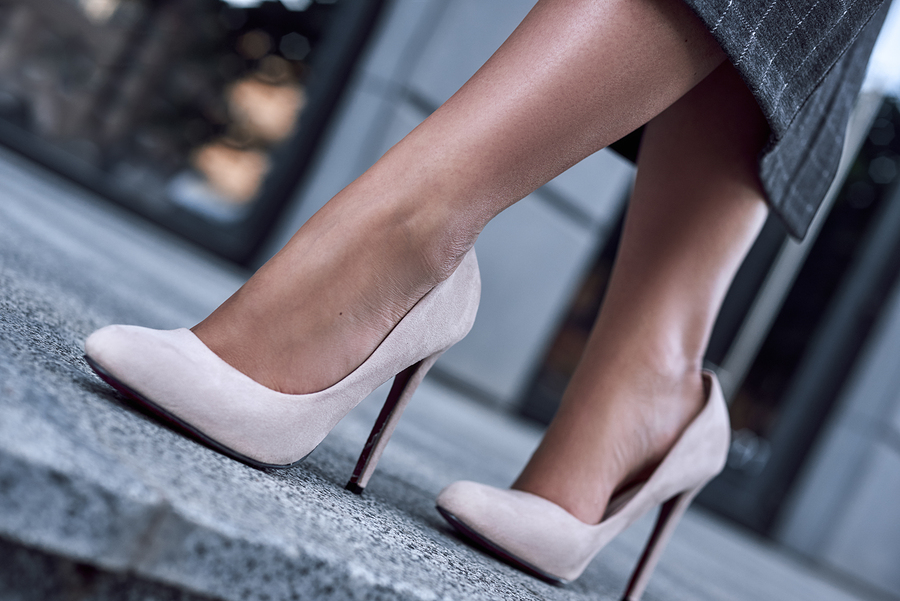Do you wear high heels every day?
High heels don’t just affect our feet but can also cause knee and back pain – so why do we keep wearing them?
For some of us it’s a fashion statement, for others it gives a feeling of being in control and those of us who just want to be a little taller it gives that extra height, but whatever the reason we wear high heels it could be time to think again.
Wearing high heels has been part of our ‘work uniform’ for many years and some employers still expect this of their female staff but lately, this has been deemed as being discriminatory and even lead to the 2016/17 government inquiry into workplace dress codes.
But if you feel you can’t stop wearing your heels then Jan Vickery, AXA PPP’s lead physiotherapist, explains how to minimise their impact on your body.
What happens to our feet?
With regular wearing of high heels, it’s our feet which suffer the most, especially if the heel is over 5 inches. The general rule is the higher the heel, the more pressure there will be on the front of the foot.
If your heel is around 2 inches (5cm) high, then the pressure on the ball of your foot is increased by approximately 52% with each step. If you wear a 3 inch (8cm) heel then this pressure will increase to around 79%.
“This extra pressure may result in bunions, callouses, thickening of the nerves between the toes and hammer toe deformities too,” Jan says. “The Achilles tendon at the back of the ankle can also become shortened.”
Read more on bunions here.
What else can be affected?
Wearing high heels tips our body weight forward and so our bodies need to work hard to stop ourselves from falling. This movement can result in extra strain on our knees and can change the way our back curves which may result in knee and back pain.
“Habitual wearing of high heels can not only damage joints of the feet but can cause deformities and even some forms of arthritis”, explains Jan. “The key is not to wear heels every day.”
Wear high heels less often
If we save our high heels for those special occasions then we shouldn’t develop those problems that come from wearing them every day.
A sensible heel height for everyday wear should not be more than 1¼ inches (3cm) high.
Jan suggests taking flat, supportive shoes to change into for walking any distances and generally limiting the time we spend in our heels as much as possible.
Tips to reduce the impact of wearing heels
If you’re a habitual high heel wearer and don’t like wearing flats then here are a few tips to reduce the impact of wearing heels:
- Shock absorbing pads, found in most chemists, can help to reduce pressure on your feet
- Do regular foot stretches – remove your heels and circle your feet. Stretch your legs out in front of you and push your heels down with your toes up, this will stretch the Achilles tendon. Or alternatively, hang both heels off the edge of a step and hold for 10 seconds
- Keep yourself fit and especially concentrate on body posture – pilates type exercises are good for this.
- Don’t wear the same height heel every day – varying the height will give your joints and tendons a rest from holding the same position day in day out
- Above all, be aware of any small aches and pains in your feet, knees or back and get medical advice before they get worse.
If you would like more information on muscles, bones and joints visit our musculoskeletal centre.
Disclaimer
All content on Silversurfers.com is provided for general information only, and should not be treated at all as a substitute for the medical advice of your own doctor or any other health care professional. Silversurfers will not be responsible or liable for any diagnosis made by a user based on the content on www.silversurfers.com and we are also not liable for the content of any external websites or links from or to Silversurfers to any other websites. Please always consult your own doctor if you’re in any way concerned about any aspect of your health
Melina - Assistant Editor
Latest posts by Melina - Assistant Editor (see all)
- Banana bread with SunGold kiwis - February 20, 2025
- A tribute to Bob Marley - February 4, 2025
- Going to Work on an Egg! - January 29, 2025
- The Very Best of Petula Clark - January 14, 2025
- 50 Years of Coat Trends - January 12, 2025




















